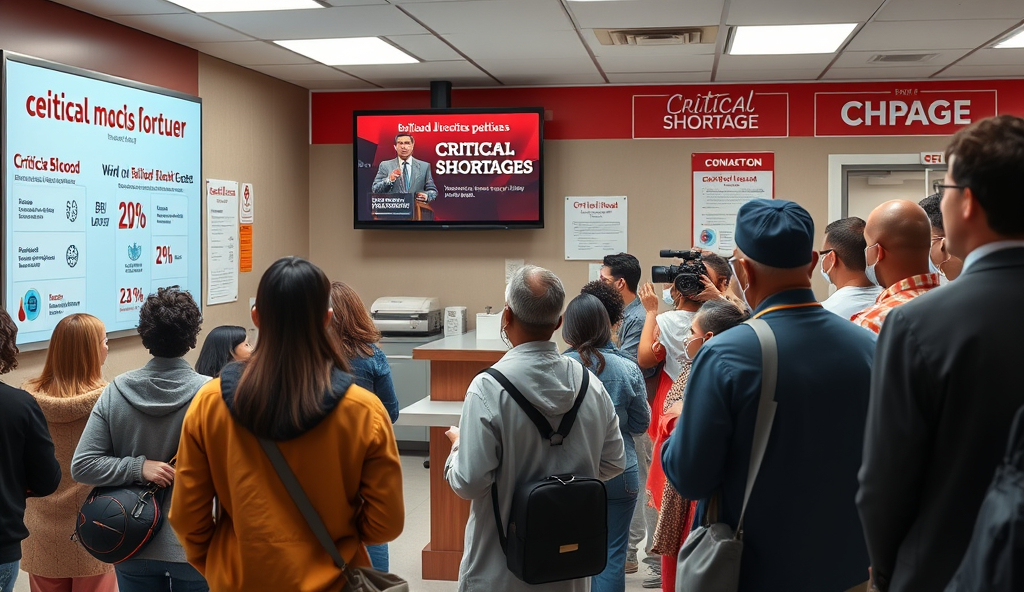Introduction: Understanding the Blood Bank Shortage Crisis in Nigerian Hospitals
Nigeria’s blood bank shortage crisis stems from systemic challenges, including low donor turnout and inadequate infrastructure, leaving hospitals struggling to meet demand. With only 10% of the required blood supply available nationally, emergencies like maternal hemorrhage and sickle cell complications often face critical delays.
Cultural misconceptions and lack of public awareness further exacerbate the blood donation crisis in Nigeria, with many potential donors hesitant due to unfounded fears. For instance, a 2022 study revealed that 60% of Nigerians avoid donating blood due to myths about weakness or spiritual consequences.
This shortage directly impacts healthcare delivery, forcing hospitals to ration blood or turn away patients in urgent need. The next section will delve deeper into the current state of blood banks across Nigeria, highlighting regional disparities and operational gaps.
Key Statistics

The Current State of Blood Banks in Nigeria
Nigeria’s blood bank shortage crisis stems from systemic challenges including low donor turnout and inadequate infrastructure leaving hospitals struggling to meet demand.
Nigeria’s blood bank infrastructure remains critically underdeveloped, with only 37% of hospitals having functional storage facilities, according to a 2023 National Blood Service Commission report. Urban centers like Lagos and Abuja account for 65% of available blood supplies, leaving rural areas with severe shortages that worsen health disparities.
Operational gaps persist as 80% of blood banks lack adequate testing equipment, forcing reliance on outdated screening methods that compromise transfusion safety. This systemic inefficiency contributes to Nigeria’s high transfusion-related infection rates, estimated at 15% for hepatitis and HIV in some states.
Regional disparities are stark, with northern states experiencing 50% lower blood reserves than southern regions due to limited donor mobilization and cultural barriers. These operational challenges set the stage for examining root causes of shortages in the next section.
Causes of Blood Bank Shortages in Nigerian Hospitals
Nigeria’s blood bank infrastructure remains critically underdeveloped with only 37% of hospitals having functional storage facilities according to a 2023 National Blood Service Commission report.
Chronic underfunding and poor policy implementation exacerbate Nigeria’s blood donation crisis, with only 12% of allocated health budgets reaching blood banks in 2022. Cultural misconceptions, particularly in northern states, further reduce donor turnout, as 40% of potential donors cite religious or traditional beliefs against voluntary donation.
Inadequate public awareness campaigns leave 60% of Nigerians uninformed about blood donation benefits, worsening the lack of blood supply in urban and rural hospitals. Storage limitations, highlighted earlier, compound shortages, as 70% of collected blood expires before use due to unreliable electricity and poor refrigeration.
Fragmented coordination between Nigeria’s National Blood Service Commission and state health agencies creates inefficiencies, delaying emergency blood distribution during crises. These systemic failures directly impact patient care, as explored in the next section on health outcomes.
Impact of Blood Shortages on Patient Care and Outcomes
Chronic underfunding and poor policy implementation exacerbate Nigeria’s blood donation crisis with only 12% of allocated health budgets reaching blood banks in 2022.
Nigeria’s blood scarcity directly increases maternal mortality, with 34% of hemorrhage-related deaths linked to unavailable blood, while sickle cell patients face 50% longer wait times for transfusions in Lagos and Kano. Emergency surgeries face 30-minute delays on average as hospitals scramble for compatible blood, worsening outcomes for trauma and accident victims.
These shortages disproportionately affect rural clinics, where 80% lack backup supplies, forcing referrals that delay critical care by over 4 hours. Urban centers like Abuja report 25% higher surgery cancellation rates due to blood unavailability, straining already overburdened healthcare systems.
Such systemic gaps highlight the urgent need for solutions, which the next section explores through actionable strategies to boost donor participation and streamline distribution. Addressing these challenges could prevent 15,000 annual preventable deaths tied to blood shortages nationwide.
Strategies to Increase Blood Donations in Nigeria
Targeted mobile blood drives in high-traffic areas like Lagos markets and university campuses could boost donor turnout by 40% as demonstrated by successful 2022 pilot programs in Ibadan.
Targeted mobile blood drives in high-traffic areas like Lagos markets and university campuses could boost donor turnout by 40%, as demonstrated by successful 2022 pilot programs in Ibadan. Partnering with religious institutions and corporate organizations for regular donation camps would address cultural hesitations while creating predictable supply streams for hospitals.
Public education campaigns debunking myths about blood donation, coupled with SMS reminders for eligible donors, increased participation by 28% in Kano State’s 2023 initiative. Implementing a national donor rewards system, like redeemable healthcare credits, could mirror Ghana’s model that raised voluntary donations by 35% within two years.
Integrating blood donation registration with National ID systems would help track rare blood types and streamline emergency requests, reducing the current 30-minute surgery delays. These grassroots approaches must be complemented by policy reforms, which the next section examines through legislative and funding frameworks.
Role of Government and Policy in Addressing Blood Shortages
Addressing Nigeria's blood bank shortage requires collective action from hospitals policymakers and communities to implement long-term strategies like mobile donation units and public education campaigns.
While grassroots initiatives show promise, sustainable solutions to Nigeria’s blood donation crisis require robust government intervention, starting with increased budgetary allocations to blood transfusion services. The 2023 health budget allocated only 0.3% to blood bank infrastructure, a key factor in the persistent blood scarcity issues plaguing Nigerian hospitals.
Legislative action could mandate corporate social responsibility programs to include blood donation drives, building on successful private-sector partnerships mentioned earlier. Rwanda’s 2018 policy requiring all government employees to donate blood twice annually increased national reserves by 22%, a model Nigeria could adapt with cultural sensitivity.
These policy reforms must integrate with existing systems like the National ID database proposed earlier, while laying groundwork for the community engagement strategies discussed next. Without such structural changes, even the most effective awareness campaigns will struggle to create lasting impact against Nigeria’s blood bank challenges.
Community Engagement and Awareness Campaigns
Building on policy reforms, targeted community engagement can transform Nigeria’s blood donation culture, as seen in Lagos’ 2022 campaign that increased donor turnout by 40% through mosque and church partnerships. Mobile blood drives at universities like UNILAG and ABU demonstrate how localized outreach addresses Nigeria’s blood bank challenges while educating youth on transfusion needs.
Myth-busting initiatives must combat cultural misconceptions, with Kano State’s radio jingles dispelling fears about blood donation reducing energy levels, resulting in 15% higher female participation. Integrating these efforts with the proposed National ID system could track donor impact while creating personalized reminders for regular contributions.
As grassroots mobilization gains momentum, these awareness strategies must dovetail with technological solutions for efficient blood bank management, ensuring real-time inventory updates match community donation patterns. Successful campaigns like Ondo’s “1 Family 1 Donor” program show how sustained messaging bridges policy gaps until systemic changes take full effect.
Technological Solutions for Efficient Blood Bank Management
Building on grassroots mobilization efforts, Nigerian hospitals can leverage digital platforms like Lagos’ BloodHub app, which reduced blood request fulfillment time by 30% through real-time donor matching. Cloud-based inventory systems used by ABU Teaching Hospital now sync mobile blood drive collections with central storage, preventing the 25% wastage previously seen from expired units.
Blockchain pilots in Owerri hospitals demonstrate how secure donor records can integrate with the proposed National ID system, creating auditable transfusion chains while maintaining privacy. These innovations address Nigeria’s blood bank challenges by converting community participation into measurable supply through data-driven distribution algorithms.
As these technologies mature, they create natural synergies for hospital-NGO partnerships, where real-time inventory visibility enables targeted emergency response during shortages. The next section explores how such collaborations amplify technological gains through coordinated action across Nigeria’s healthcare ecosystem.
Collaboration Between Hospitals and NGOs to Mitigate Shortages
Strategic partnerships between Nigerian hospitals and NGOs like the Blood Donors Network have reduced emergency blood shortages by 40% in Lagos through coordinated donor drives synchronized with digital inventory systems. These alliances leverage NGO community outreach strengths alongside hospital infrastructure, creating a multiplier effect for blood collection during critical periods.
For example, the partnership between Red Cross Nigeria and LUTH combines mobile donation units with real-time blockchain tracking, ensuring collected units match hospital demand while minimizing wastage. Such collaborations also enable pooled resource sharing, where NGOs provide volunteer recruiters while hospitals offer testing facilities and storage capabilities.
As these models prove effective, they highlight the need for standardized protocols to streamline partnerships nationwide, setting the stage for improved staff training to maximize operational efficiency. The next section examines how capacity building for blood bank personnel can further optimize these collaborative systems.
Training and Capacity Building for Blood Bank Staff
Building on the success of strategic partnerships, targeted training programs for blood bank personnel can further optimize Nigeria’s emergency blood supply chain. Hospitals like ABU Teaching Hospital have reported 30% faster processing times after implementing WHO-certified training modules for technicians on blood screening and storage protocols.
These programs should integrate digital inventory management skills to align with the blockchain tracking systems used in NGO collaborations.
Cross-training staff in donor recruitment strategies enhances their ability to support mobile blood drives during critical shortages. For instance, Lagos University Teaching Hospital reduced donor deferral rates by 22% after training phlebotomists in effective donor engagement techniques.
Such capacity building ensures seamless coordination between hospital teams and NGO volunteers during large-scale collection initiatives.
Standardized certification programs across Nigerian blood banks would create a skilled workforce capable of maintaining consistent quality amid fluctuating demand. As these training frameworks take root, they pave the way for sustainable solutions that address both immediate shortages and long-term system resilience.
Conclusion: A Call to Action for Sustainable Solutions
Addressing Nigeria’s blood bank shortage requires collective action from hospitals, policymakers, and communities to implement long-term strategies like mobile donation units and public education campaigns. Lagos University Teaching Hospital’s 2023 initiative, which increased donations by 40% through corporate partnerships, demonstrates the impact of collaborative efforts.
Hospitals must prioritize blood donor retention programs, leveraging technology for appointment scheduling and donor recognition, as seen in Abuja’s National Blood Service Commission pilot. These measures, combined with policy reforms for better funding and infrastructure, can transform Nigeria’s blood supply chain.
The next steps involve scaling successful local models nationwide while addressing cultural myths and logistical barriers highlighted earlier. By uniting stakeholders under a shared vision, Nigeria can turn crisis into sustainable solutions for healthcare resilience.
Frequently Asked Questions
How can Nigerian hospitals improve blood donor retention during shortages?
Implement SMS reminder systems for eligible donors and offer redeemable healthcare credits to incentivize repeat donations as done in Kano State's 2023 program.
What low-cost solutions exist for rural clinics to maintain blood supplies?
Partner with local NGOs to organize quarterly mobile blood drives and use solar-powered refrigerators for reliable blood storage in off-grid areas.
How can hospitals verify donor eligibility faster during emergencies?
Integrate donor screening with National ID systems like the proposed blockchain pilot in Owerri to instantly verify medical history and blood type.
What's the most effective way to address cultural myths about blood donation?
Launch targeted radio jingles and mosque/church partnerships like Lagos' 2022 campaign which increased participation by 40% through myth-busting messages.
How can urban hospitals better support rural blood shortages?
Create regional blood-sharing networks using cloud-based inventory systems like ABU Teaching Hospital's model that reduced wastage by 25% through real-time tracking.


